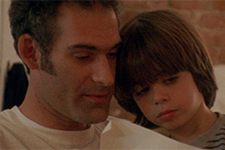Daddy Longlegs
|  As I have noted in several other reviews, I tend to resist films about selfish, myopic, and self-destructive protagonists, which unfortunately are one of the favored character types of American independent cinema. At the same time, I have also noted that one of the primary powers of great narrative art is its ability to engage you with characters who, in real life, you wouldn’t want to share space in the same room. This dichotomy is central to Daddy Longlegs, the micro-budget writing/directing debut of brothers Benny and Josh Safdie. Based on their own memories of time spent as kids with their divorced father, the film is a deft portrait of bad parenting—not bad in the sense of intentional or cruel, but rather parenting that consistently (and predictably) fails due to inexperience, lack of planning, poor judgment, and good ol’ fashioned laziness. The film is both humorous and harrowing, and even though it drags at times, its sense of repetition is crucial to its protagonist’s primary flaws. Said protagonist is Lenny Sokol (Ronald Bronstein), a Bronx-dwelling divorced father of two rambunctious boys: 10-year-old Sage (Sage Ranaldo) and 8-year-old Frey (Frey Ranaldo). The film takes place over a two-week period, the two weeks out of the year that Lenny gets to spend with the boys, who otherwise live with their much more responsible mother, Paige (Leah Singer) and her second husband. The film gets off on a bad note, with Lenny being confronted by the boys’ exasperated school principal (Victor Puccio), which he meets with angry dismissal. It is exactly the kind of overly pitched clash between a rebellious outsider and a cliched figure of authority that often defines smug indie film, but thankfully this scene is more the exception than the rule, as the film quickly settles into a mundane-realistic rhythm of Lenny’s struggles to care for Sage and Frey while also managing the chaos of his own life, which involves his job running projection at a Manhattan repertory theater and a sometimes girlfriend (Eléonore Hendrick) who wants to be a bigger part of his life. Lenny’s primary antagonist, though, is himself, as he constantly complicates his own life with poor choices that are often borne of his own self-interest. At other times, though, life throws boulders in his path that he must circumvent the best he can, including a sequence in which he is unexpectedly called into an all-nighter at work checking prints, which leads him to give Sage and Frey sleeping pills so they won’t wake up and find him gone. The results of that decision bring the film to a dramatic pitch that didn’t seem possible in its opening moments. Interestingly, Daddy Longlegs gets better as it goes, possibly because we become more and more engaged with Lenny, who Bronstein (who is himself a successful independent director) plays as a mix of scruffy charm, deadbeat languor, and childlike wonder. He is often great with Sage and Frey because it is easy for him to slide into the role of fellow child; he is a great playmate, but flounders whenever he must step into the role of mature authority figure. Mostly, he just loses his cool, which doesn’t work well with a couple of precocious boys who just want to have fun. We feel for Lenny because we sense that, in his own rag-tag way, he is really trying and that he genuinely loves his kids, although that doesn’t mean they don’t wear on him and he often yearns to get away from them, which is what most often causes him problems. The Safdie Brothers have a good sense of how to convey the stark reality of Lenny’s meager existence without turning the film into a sob story. There is great humor to be found throughout, aided and abetted by the freewheeling, handheld cinematography by Brett Jutkiewicz (The Black Phone) and Josh Safdie, which gives the film the sense that it was found, rather than made. The Safdies’ autobiographical impulse keeps them from hurling judgment on Lenny, which means that the film is somewhat ambiguous about his character. While he is clearly flawed as a human being and makes some terrible choices, we are also encouraged to celebrate what he does well. The film’s final moments don’t offer any sense of closure, but they do find yet another balance between Lenny’s authentic love for his kids and the imprudent decisions he makes that lead him to the edge of disaster.
Copyright © 2022 James Kendrick Thoughts? E-mail James Kendrick All images copyright © The Criterion Collection | |||||||||||||||||||||||||||||
Overall Rating: 

 (3)
(3)


